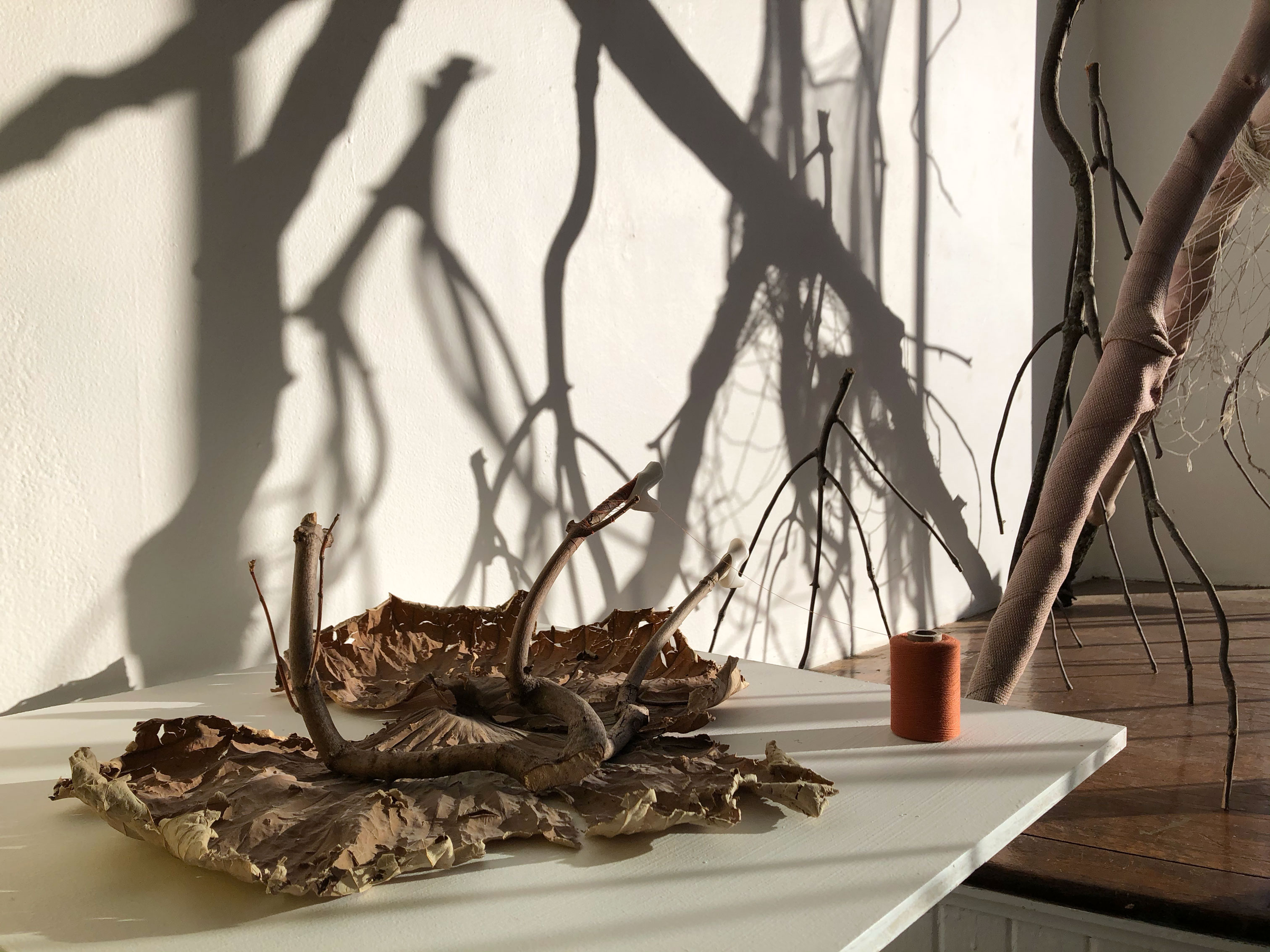
Julio Flores’s MFA exhibition Belonging is an installation of a collection of collections: of embellished tree branches, old balls, figurines of the Virgin Mary, Café Bustelo cans, corkboards, curio mirrors, produce stickers…. For Flores, these objects are not just things or trash, but beings in their own right. The process of collecting and arranging them, then, becomes a way of remembering or refiguring the relationships that exist between ourselves and our world. The resulting sculptures and assemblages are by turns intense and humorous, sentimental and inquisitive. Inhabiting our gallery for the rest of this year, they ask: how do we belong?
Artist statement
My belongings make me laugh. They console me. As objects or as feelings, I find belongings paradoxically burdensome, too. Collecting and categorizing possessions is an obsessive, time consuming behavior that I began as a kid—a behavior that’s as much spontaneous as it is premeditated, and it doesn’t stop.
A sense of belonging couldn’t be more pertinent today as we face an alarming political, social and health climate. I, myself, am “possessed” by the United States (my family emigrated here from Puerto Rico, a U.S. territorial possession since 1898). Latin American cultural influences like festivals, food and folk art inform my collections and my personal work aesthetically, methodologically and narratively. I often work within the context of Latino traditions like Rascuache, embellishing and transforming found objects to push the boundaries of domestic and intimate storytelling. I practice this aesthetic by creating the most from the mundane — a stance that’s both defiant and inventive in response to affluence that’s out of my reach.
I collect and create to maintain for myself a sense of belonging, and I believe it’s true that I don’t have to fear others or my own self. Yet, I infuse my work with an undercurrent of acting out, questioning, and navigating between dualities of being Puerto Rican and American, parochial and blasphemous, exacting and ambiguous, or being a socialite and a loner. Behavioral impulses in interpersonal relations, let alone in collecting and categorizing are what I am interested in addressing in my work.
Mine is a hybrid methodology influenced by what I think is my circumstantial identity. My installation work can be meticulous, arranging multiples of the same or similar banal objects, which draws attention to their individual nature. The “theaters” that spaces become for my assemblages and installations not only emphasize my concepts about the autonomy of individual objects in close proximity to a collective, but also the related metaphor conveyed about interrelated people. It’s a process that both engages and records my behavior as much as my belongings.
In her book, Staying with the Trouble: Making Kin in the Chthulucene, theorist Donna Haraway presents the idea of preserving what’s left of a damaged earth, and living responsibly with all its cohabitants. The way of life Haraway envisions would happen out of love and rage, as she writes.
Featured in my MFA thesis exhibition are my “stick figures,” anthropomorphic sculptures trimmed from the branches of trees that have local significance or sentimental value for me. One such sculpture I trimmed from a very large tree limb that fell onto power lines during a storm near my apartment and knocked out the power to our building. Rescuing a large branch from the tree limb, I proceeded to enter into an “interpersonal” relationship with it, eventually wrapping it with heavyweight cloth. For over two years, I maintained and shared and built a narrative around this sculpture with my neighbors. Taking Haraway’s vision into account, my intention was to present a compelling alternative to dealing with what may feel like nature’s inconveniences.
I think I get stuck having relationships with my work and documentation, instead of establishing rapport with new acquaintances, and maintaining relationships I’ve already established. I’m choosing how to remember as opposed to what to remember, which I admit is an odd way of assessing my theory, that intimate relationships profoundly affect social attitudes and public behavior.
—Julio Flores
About the artist
Julio Enrique Flores is a visual artist, art educator, and communications professional. His art practice includes kite- and mask-making in the Puerto Rican tradition, as well as painting, drawing and other creative work. Over the past twenty-five years, he has exhibited his artwork, led hands-on workshops for students, and worked in communications at corporate, cultural, and educational institutions throughout the Midwest. Currently, Julio is an MFA candidate at the University at Buffalo, and he most recently exhibited at the Western New York Book Arts Center.
